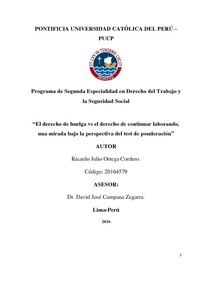| dc.contributor.advisor | Campana Zegarra, David José | |
| dc.contributor.author | Ortega Cordero, Ricardo Julio | es_ES |
| dc.date.accessioned | 2017-04-10T21:39:02Z | es_ES |
| dc.date.available | 2017-04-10T21:39:02Z | es_ES |
| dc.date.created | 2016 | es_ES |
| dc.date.issued | 2017-04-10 | es_ES |
| dc.identifier.uri | http://hdl.handle.net/20.500.12404/8386 | |
| dc.description.abstract | ¿Derecho de huelga o derecho de continuar laborando?; durante el ejercicio del
derecho de huelga, es común encontrar situaciones en las cuales intereses de los
huelguistas entran en conflicto con derechos de terceros; uno de estos casos se presenta
respecto de los trabajadores que no se encuentran de acuerdo con la medida de
paralización –trabajador no huelguista- y que desean continuar laborando a fin de
seguir generando los ingresos económicos necesarios para garantizar su subsistencia y
la de su familia.
Según nuestra legislación, cuando la huelga es decidida por la mayoría de trabajadores
de un determinado ámbito, suspende la relación laboral del total de trabajadores que lo
comprende; incluyendo la de aquellos que no se encuentren de acuerdo con la medida
de paralización; en este orden de ideas, el presente artículo, a través del llamado test de
proporcionalidad, determinará si la privación legal del artículo 62 del D.S. 011-92-TR,
resulta una medida realmente indispensable para alcanzar los fines perseguidos por el
ejercicio de la huelga o si por el contrario, se estaría vulnerando de manera innecesaria
el derecho de aquellos que desean continuar trabajando. | es_ES |
| dc.description.abstract | Right to strike or right to continue working? During the exercise of the right to strike, it
is common to find situations in which the interests of the strikers conflict with the rights
of third parties; One of these cases is presented in respect of workers who do not agree
with the stoppage measure - non-striking worker - and who wish to continue working in
order to continue generating the economic income necessary to guarantee their
subsistence and that of their family.
According to our legislation, when the strike is decided by the majority of workers in a
given area, it suspends the employment relationship of the total number of workers who
comprise it; including those who do not agree with the stoppage measure. In this
context, this article, through the so-called proportionality test, will determine whether
the legal deprivation of Article 62 of D.S. 011-92-TR, is a truly indispensable measure
to achieve the aims pursued by the exercise of the strike or if, on the contrary, the right
of those who wish to continue working would be unnecessarily violated. | es_ES |
| dc.language.iso | spa | es_ES |
| dc.publisher | Pontificia Universidad Católica del Perú | es_ES |
| dc.rights | info:eu-repo/semantics/openAccess | es_ES |
| dc.rights.uri | http://creativecommons.org/licenses/by/2.5/pe/ | * |
| dc.subject | Huelgas y paros--Legislación--Peru | es_ES |
| dc.subject | Derecho laboral--Perú | es_ES |
| dc.subject | Conflictos laborales--Perú | es_ES |
| dc.title | El derecho de huelga vs el derecho de continuar laborando, una mirada bajo la perspectiva del test de ponderación | es_ES |
| dc.type | info:eu-repo/semantics/bachelorThesis | es_ES |
| thesis.degree.name | Segunda Especialidad Derecho del Trabajo y de la Seguridad Social | es_ES |
| thesis.degree.level | Título Profesional | es_ES |
| thesis.degree.grantor | Pontificia Universidad Católica del Perú. Facultad de Derecho | es_ES |
| thesis.degree.discipline | Derecho del Trabajo y de la Seguridad Social | es_ES |
| renati.advisor.dni | 06178387 | |
| renati.advisor.orcid | https://orcid.org/0000-0003-1848-8799 | es_ES |
| renati.discipline | 422059 | es_ES |
| renati.level | https://purl.org/pe-repo/renati/level#tituloSegundaEspecialidad | es_ES |
| renati.type | https://purl.org/pe-repo/renati/type#trabajoAcademico | es_ES |
| dc.publisher.country | PE | es_ES |
| dc.subject.ocde | https://purl.org/pe-repo/ocde/ford#5.05.01 | es_ES |






